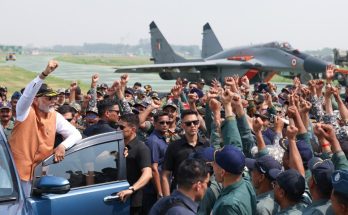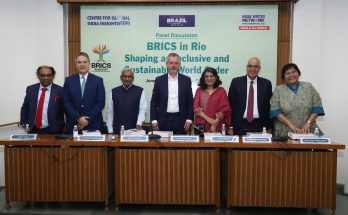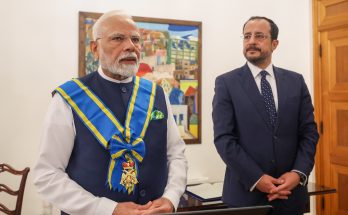
BALI: In Bali, better known for magical sunsets, sun-kissed sea and serenity, India’s Prime Minister Narendra Modi will join the leaders of the world’s most powerful nations for the G20 summit next week, with the overarching goal of healing and unifying a badly fractured world, polarised and splintered by the Ukraine war. The high moment of PM Modi’s Bali journey (November 14-16) will be the symbolic handover of the G20 presidency by Indonesian President Joko Widodo to India at the end of the Bali summit. India will officially take over presidency of the G20 on December 1, 2022 and will host the summit on September 9-10, 2023, the first time the country will lead the world’s most influential grouping, post the 2008 global financial meltdown which brought G20 into being.
Ukraine Muddle
The Russia-Ukraine war, with its corrosive knock-on effects on global economic growth, food, fuel and fertiliser prices, will cast its long shadow at the Bali summit as well during India’s G20 presidency. Russian President Vladimir Putin has taken a prudent decision to stay away from the Bali summit, but his assertive foreign minister will be present in Bali, which could ignite some rhetorical fireworks around the Ukraine crisis.
US President Joe Biden will lead the charge of the West against what Washington sees the weaponization of food and fuel by Russia in the wake of the Ukraine war. G7 countries are set to rally around the US to take on Russia. One can expect partisan polemical duelling in Bali, putting India under pressure. PM Modi is, however, expected to display delicate diplomatic finesse as he juggles competing poles in a conflicted world. PM Modi’s gentle reminder to Russian President Vladimir Putin in Samarkand that “this is not the age of war”, while at the same time stressing on the “unbreakable friendship” between India and Russia will remain a template of India’s response which is unlikely to change in Bali. It’s possible that PM Modi may signal New Delhi’s willingness to play the role of a peacemaker by leveraging excellent relations with rival parties.

But the obsessive focus on the Ukraine crisis, in New Delhi’s view, detracts from the core G20 agenda of economic recovery and revival. India will not like the G20 summit in Bali or its presidency to be hijacked by the Ukraine crisis and politicking as the current global economic crisis requires urgent international response and all hands on deck. At a deeply polarising time like this, PM Modi is likely to appeal to world leaders to shun geopolitical manoueverings and concentrate the collective power of G20 on resolving bread-and-butter issues on which depend lives of millions around the globe. In this regard, the G20 summit in Bali is fittingly themed: “Recover Together, Recover Stronger”. Three working sessions will be held as part of the G20 Summit Agenda – food and energy security; health; and digital transformation.
Restoring global growth and promoting inclusive, resilient and sustainable growth will be pivotal to India’s agenda at both the Bali summit and during India’s presidency of G20. The latest IMF’s World Economic Outlook released in October forecasts that global economic growth will slow down from 3.2 percent this year to 2.7 percent next year. PM Modi is also expected to pitch for inclusive and balanced growth as there are disparities in growth among different countries of a region as well as differences among regions of the same country, he said.
Green Growth
In Bali, PM Modi is expected to speak about climate finance and green growth – two themes close to his heart. India will leverage its political capital to evolve a consensus within G20 to fast-track delivery of climate finance to developing countries on a priority basis.
The Paris Accord pledge by developed countries to provide $100 billion annually by way of climate finance still remains a pipedream. Under India’s presidency, official sources said that India will invest extra political capital and go out of the way to raise the ambition for climate finance. As India takes over the G-20 presidency, India will be working on several initiatives to accelerate green energy transition through promotion of green hydrogen and solar energy through International Solar Alliance.
India’s G20 Presidency: Hope & Harmony

In both Bali and during its G20 presidency, India’s central thrust will be to refurbish the country’s global leadership skills on an entire range of cross-cutting issues such as climate action, energy security, food security, robust public health systems, shaping green growth and the acceleration of the 2030 Sustainable Development Goals (SDGs) agenda.
Prime Minister Modi’s remarks at the Bali summit will provide a preview of major themes of India’s presidency of G20. The central message will be that of hope, harmony and healing in times of turbulence and conflict. The official logo of India’s G20 presidency, unveiled by PM Modi on November 8, comprising a blooming lotus cradling the earth, highlights the master theme of “One Earth, One Family and One Future,” as reflected in the ancient Sanskrit ethos as “Vasudahaiva Kutumbakam.”
“Seven petals on Lotus represent seven continents of the globe and also seven notes of music. G20 will bring the world together in harmony. In this logo, Lotus flower is depicting the mythological heritage of India, our faith, our intelligence,” PM Modi said during the logo’s launch. The Symbol of the lotus in G20 Logo is representation of hope in these times, said PM Modi.
Being the world’s largest democracy and home to one fifth of humanity, India has a special responsibility to provide creative global leadership to address pressing challenges, ranging from food insecurity and energy crisis to terrorism and effective multilateralism, in order to resolve contentious issues.
By all reckoning, India’s time under the global sun has finally arrived. The year 2023 will be a defining one for showcasing India’s unique global leadership skills as the country hosts summits of two influential multilateral groupings, G20 and SCO. With hope and harmony as the twin mantra, India is set to blend its civilizational ideal of “vasudhaiva kutumbakam” (One World, One Family), and its growing economic prowess, to emerge as a bridge-builder between the North and the South.

(Manish Chand is CEO-Editor-in-Chief, India Writes Network, and India and The World magazine. He is Director, Centre for Global Insights India, a think tank focused on global affairs. He is in Bali to report on and anlyse the G20 summit)
Author Profile

- Manish Chand is Founder-CEO and Editor-in-Chief of India Writes Network (www.indiawrites.org) and India and World, a pioneering magazine focused on international affairs. He is CEO/Director of TGII Media Private Limited, an India-based media, publishing, research and consultancy company.
Latest entries
 India and the WorldJune 16, 2025Amid Pakistan-Turkey nexus, Cyprus joins India against cross-border terror
India and the WorldJune 16, 2025Amid Pakistan-Turkey nexus, Cyprus joins India against cross-border terror India and the WorldMay 8, 2025Pahalgam payback: India exposes Pakistan’s lies, misuse of religious sites for training terrorists
India and the WorldMay 8, 2025Pahalgam payback: India exposes Pakistan’s lies, misuse of religious sites for training terrorists India and the WorldMay 3, 2025IMEEC provides a democratic alternative to BRI: Italy’s former foreign minister (Interview)
India and the WorldMay 3, 2025IMEEC provides a democratic alternative to BRI: Italy’s former foreign minister (Interview) India and the WorldApril 21, 20253T Template for India-US Mega Partnership
India and the WorldApril 21, 20253T Template for India-US Mega Partnership







